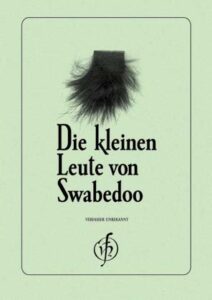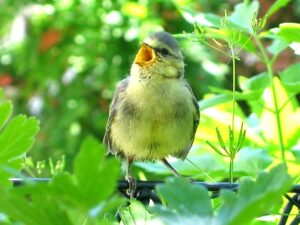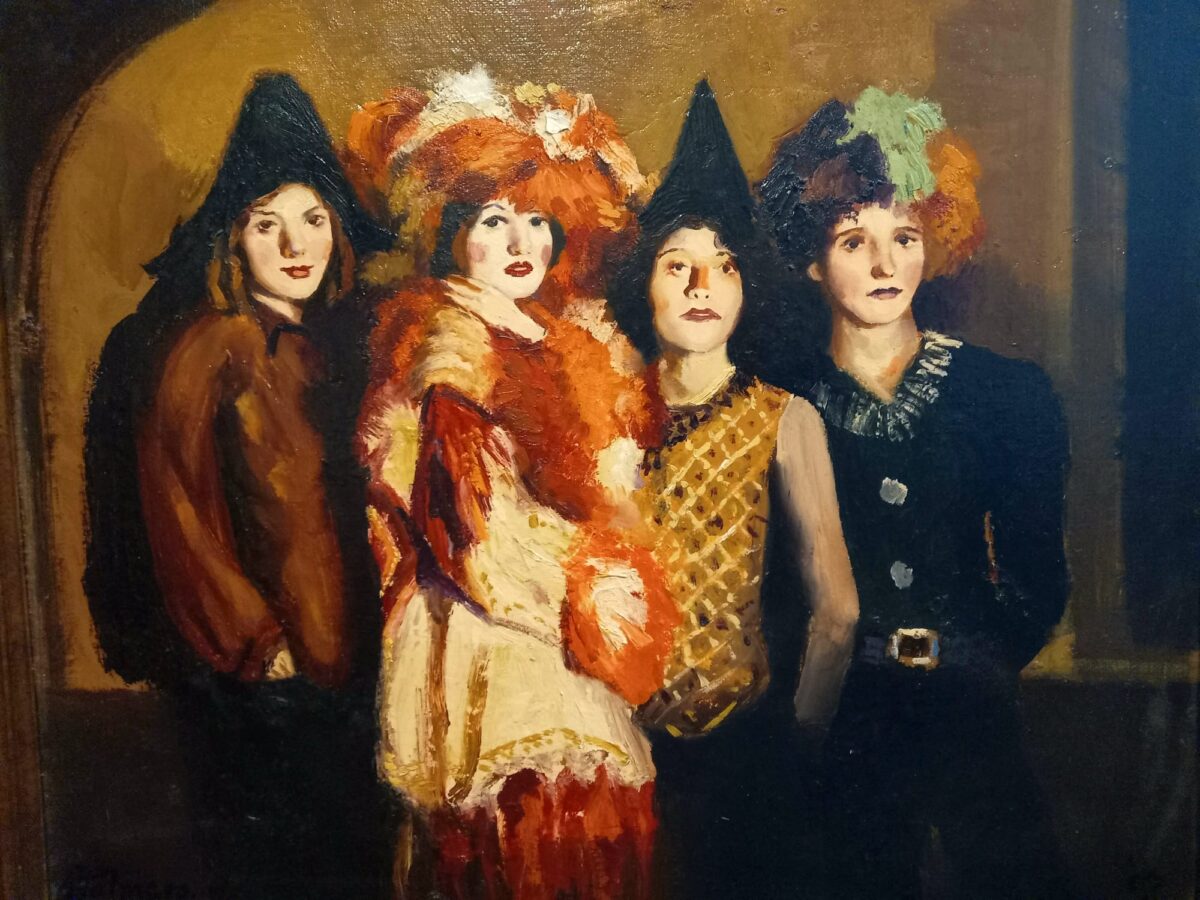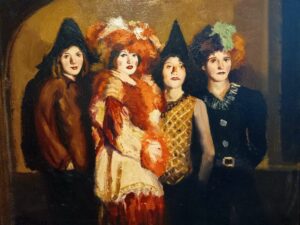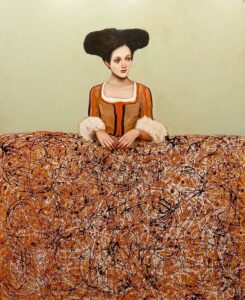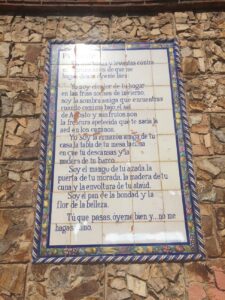
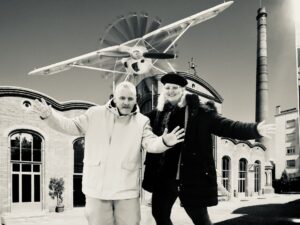 Liebe Freund:innen, liebe Leser:innen dieses Blogs,
Liebe Freund:innen, liebe Leser:innen dieses Blogs,
wieder mal naht die Weihnachtszeit, die ja bekanntlich stets Anlass für Grübeleien ist – im besten Fall für Reflexionen… Habt Ihr/Haben Sie manchmal auch das Gefühl, dass die Erzählzeit länger als die erzählte Zeit ist, und die Mühlen des Herrn unwahrscheinlich langsam mahlen…? Und dabei bin ich doch Verfechterin von slow food und slow fashion und habe in mancherlei Hinsicht die Langsamkeit für mich entdeckt. Aber manchmal kann ich das Warten auch nicht ausstehen. Ehrlich gesagt. Frank und frei gesprochen. Wie lerne ich es nur, noch geduldiger zu werden? Herr, gib mir Geduld – aber schnell! 😉 Ich kann ja nicht das ganze Leben nur warten…
Hier ein kleiner Vorgeschmack auf meinen neuen Gedichtband, der “in Arbeit” ist. Der letzte Titel “Violett Light” drückt das endlose Warten aus, das besonders diejenigen Menschen betrifft, die in abgelegenen Dörfern leben. Man lernt durch das Warten auf den Bus ein bisschen Geduld, aber manchmal ist es auch einfach nur zum SCHREIEN… 😉 Dabei ist mir durchaus bewusst, dass alles relativ ist. Da, wo ich wohne, ist der öffentliche Nahverkehr eigentlich sehr gut… Also am besten zunächst die eigene Einstellung ändern, Frau Doris. Und weiter Bus und Bahn fahren… Oder zu Fuß gehen… So wie neulich…
Viel Spaß beim Lesen von “Violett Light” und Frohe Weihnachten! Feliz Navidad! Bon Nadal!
Violett Light
Standing at the bus stop all my life:
Will it ever come, the yellow bus?
I’ll put down roots after a while;
Ivy winding around my legs;
My limbs overgrown with moss;
Little twigs growing out my fingers;
My head covered with leaves.
A crown of laurels? – No way.
Little sparrows whispering waggishly:
Waiting is all for nothing, my dear!
We’ll weave you a gown of feathers.
Fly away on the wings of the wind!
Freedom is around the corner,
Reaching out for you, calling your name…
Suddenly a beeping, screeching tyres…
The yellow bus appearing with velocity.
Tearing yourself away from the ground,
A violent effort, in the violett evening light,
You stretch, shake and sing silent songs;
Rejoicing then loudly when you reach out
Towards the sky, when you finally fly away…
Little sparrows at your side.
In the violett evening light.
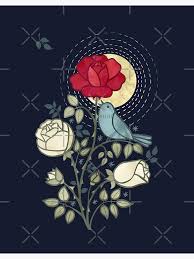
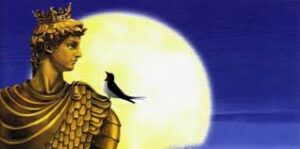 Brauchen wir Märchen? Von Waisen und Weisen… (Lesezeit: Fünf Minuten ;))
Brauchen wir Märchen? Von Waisen und Weisen… (Lesezeit: Fünf Minuten ;))
A Translation will follow… 🙂
Mal wieder ein Thema, das mich bewegt. Wozu die ganze Fiktion in unserem Leben? Das Leben ist nun mal kein Märchen. Das müssen wir erkennen, je älter wir werden. Und je älter ich werde, denke ich: Gott sei Dank! Gott sei Dank ist das Leben kein Märchen, denn manche Märchen sind zwar zauberhaft-schön, aber auch unwahrscheinlich traurig. Ich denke da vor allem an Kunstmärchen wie „The Happy Prince“ oder „The Nightingale and the Rose“ von dem von mir verehrten Oscar Wilde. Wilde erzählt wunderschön, wie ein kleiner Vogel (War es eine Schwalbe?) Stück für Stück von der Statue eines Prinzen zu den armen Menschen des Ortes trägt: Blattgold und bunte Edelsteine. Zum Schluss bleibt nur ein Haufen Blech übrig…
Ebenso zerriss es mir als junger Studentin das Herz, als ich „The Nightingale and the Rose“ gelesen habe: Hier opfert eine Nachtigall ihr Leben, damit aus ihrem Herzblut im Winter eine rote Rose entstehen kann, die ein Student der Tochter des Professors schenken möchte, um ihre Liebe zu gewinnen. Der Vogel ist am Morgen tot. Die Tochter des Professors verschmäht die Liebe des Studenten. Die aus dem Herzblut der Nachtigall gewonnene Rose wird achtlos weggeworfen… Als junger Mensch war ich zutiefst gerührt von diesen Texten, und auch jetzt sind sie noch bedeutsam für mich. Aber anders. Ich denke, was Wilde uns wirklich sagen möchte, ist, dass manches aufopferungsvolle Verhalten in seinem Ausmaß sinnlos ist. Sind es die anderen denn überhaupt wert, dass wir soviel geben? Oder werden wir manchmal nicht schamlos von unseren Mitmenschen ausgenutzt??? Wir sollten schon genau überlegen, für wen wir was machen? Nicht alle Beziehungen sind symmetrisch; das versteht sich von selbst. Aber die meisten sollten es sein… Das ist ganz im Sinne von Sokrates. Im Sinne der Religionen dieser Welt. Im Sinne der Menschlichkeit.
Man sieht an diesem Beispiel, dass die Auseinandersetzung mit einem Text mehrmals im Leben erfolgen sollte. Man hat wieder ein bisschen mehr gelebt, Erfahrungen gesammelt und ist ein bisschen klüger geworden, auch wenn die gewonnenen Einsichten manchmal ernüchternd sind. Wie dem auch sei: Es gibt so viele Beispiele für Märchen, mit denen wir uns auseinandersetzen sollten. Hans Christian Andersen zum Beispiel… Wie war noch mal die Geschichte des armen Mädchens, dass langsam während des harten Winters in nördlichen Gefilden erfriert, bis es endlich wieder mit ihrer toten Großmutter vereint ist? In einer besseren Welt. Ich denke, das Erfrieren ist hier sowohl ein körperlicher als auch ein seelischer Tod in einer dem schwachen Individuum gegenüber oftmals gleichgültigen Welt. Armes Mädchen, ja gewiss. Das Wiedersehen mit der Großmutter hätte sicherlich noch etwas warten können… Hat wirklich niemand gesehen, dass es so sehr litt? Wieder ein sinnloses Sich-Aufopfern. Und ein Anlass über unsere zukünftige Energieversorgung im Einklang mit unserer Umwelt nachzudenken. Ich persönlich habe es gerne muckelig. 🙂
Jetzt kommen mir die Romane von Charles Dickens in Sinn. Arme Waisenkinder, die in die Hände von Strolchen, Schurken und Bösewichten geraten. Bei manchen dieser Figuren sträuben sich meine Nackenhaare, vor allem bei Scrooge im Weihnachtsmärchen („A Christmas Carol“). So ein elendiger Geizknochen! Gott sei Dank endet die Geschichte gut, wenn ich sie richtig in Erinnerung habe… Erinnerungen und Gedanken bleiben stets, überdauern das hier und jetzt. Meistens erinnern wir uns an das Gute. An Großzügigkeit und Hilfsbereitschaft. Und das ist gut so. 🙂
„Der Fischer und sein Frau“ von den Geschwistern Grimm ist ebenfalls interessant. Die Fischersfrau möchte sich verbessern. Und der Butt im Meer erfüllt ihr nach und nach ihre Wünsche, auch wenn sie ihren Mann schier zum Verzweifeln bringt. Und doch hat sie zunächst recht. Es ist normal, dass Menschen suchen, dass sie ihre Situation verbessern wollen. Das ist auch förderlich für Handwerk, Wirtschaft und Handel, denn es treibt uns voran, gibt uns drive, gibt uns Initiative. Eine mögliche Verbesserung unserer Situation motiviert uns zum Lernen, zum Entdecken, zum Suchen nach Lösungen. Die Frau im Märchen hat es einfach: Ihr fällt die Suche nach einem neuen Mietobjekt quasi in den Schoß. Im wahren Leben dauert Wohnungssuche weitaus länger, und Umzüge können traumatisierende Erfahrungen sein. Wir müssen viel Geduld haben. Und dennoch beneide ich die Fischersfrau im Märchen nicht. Sie verliert das Maß außer Augen, was ihr zum Verhängnis wird. Sie ist am Ende genauso weit wie vorher. Aber wenn man schreibt, dann weiß man, dass das Ende einer Geschichte manchmal ziemlich willkürlich ist. Hat der Schriftsteller am nächsten Tag bessere Laune, schreibt er die Geschichte vielleicht nochmals um, und der Fischersfrau ergeht es vielleicht etwas besser. Vielleicht setzt sie sich hin und fragt sich, was sie wirklich braucht? Einen Palast oder Ruhe und Behaglichkeit in stürmischen Zeiten? Wir sind die Schriftsteller unseres Lebens. Jeder Tag ist ein neues Kapitel. Und langsam füllen sich die Seiten unseres Buches…
Und was sollte man denn nun zu Weihnachten lesen?
Weiß ich nicht. Vieles, je nach Lust und Laune, nach Lesegeschmack. Oft ist nur leider nur wenig Zeit da zum Lesen, obwohl es nichts Schönes gibt, bis auf Musik… Also, wenn man nur wenig Zeit hat, dann sollte man sich natürlich sehr gut überlegen, was man lesen möchte. Hier nur zwei Tipps für Kurzgeschichten, die ja zum Zeitgeist der Eiligen, der Rasenden, der Flitzer passen: „Der Schmuck“ von Guy de Maupassant und „Das Geschenk der Waisen“ von O’Henry. Letzterer Text ist so wunderschön. In dieser Geschichte, die von zwei Liebenden handelt, wird auch sehr viel gegeben. Aber hier ist es nicht umsonst. Ganz im Gegenteil. Ich wünsche allen eine schöne Adventszeit! Liebe Grüße aus Spanien! 🙂
A – N – N – A
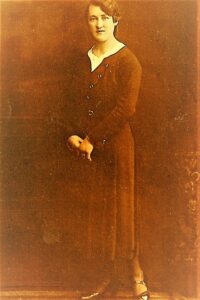 – Omi –
– Omi –
“¿La buena gente a veces molesta, sabías?”
No me acuerdo donde he leído esta frase… Es mentira. Me acuerdo muy bien. No sé de quién es. Es verdad. No lo sé.
Cuando leí esta frase, pensé en seguida en mi abuela querida. Su historia, al mismo tiempo la historia de familia, me hizo reflexionar sobre su vida y su enfermedad grave con casi cien años… Mis recuerdos aún están muy vivos…
La vida de mi abuela no era fácil. Nació en 1909, pocos anos antes de la Primera Guerra Mondial que ensombrecía su infancia. Luego, la Segunda Guerra Mundial. Recién casada, su primero marido tuvo que ir al frente por la estupidez y la codicia de un mundo vuelto loco. Luego, con suegros duros, se encontró en una granja de donde tenía que huirse al final… Una mujer sola entre las garras de gente que le hacía sufrir y las circunstancias crueles de su tiempo…
Me acuerdo muy bien – como si hubiera sido ayer – de los intentos repetitivos de mi abuela de irse de casa para volver a “su” casa cuando estaba “enferma”. Ya estaba muy mayor y caminaba con un andador, si no se hubiera ido seguramente. “Me voy a casa” con estas palabras se puso siempre de camino. Era una mujer con una voluntad firme, una mujer fuerte y bondadosa.
“Mama, ¿tú crees que estuvo feliz durante este tiempo de su enfermedad, tu madre? “Si, creo que sí.”, contestó mi madre.” Estaba casi siempre contenta y de buen humor.” Se lo he preguntado a mi madre porque ella, mi héroe, siempre cuidaba a mi abuela con mucha dedicación.
“Ich hab mein Herz in Heidelberg verloren…”
Sí, es verdad, “mi abuela fue feliz”, la mayoría del tiempo. A pesar de todo. Anna, eso es el nombre mi abuela, pasaba todo el día cantando. No cantaba nada bien, pero le encantaba cantar. Es lo que importa, al final. Muchas veces sentíamos que ibamos a perder la paciencia al escucharla repetir una y otra vez la misma melodía y fuimos impacientes con ella. Seguro que sabe que nos arrepentimos y nos “vigila” desde arriba. Hacemos todos errores. Sólo hace falta pedir disculpa y no repetirlos. Ya está…
Es un poco paradójico, en mi opinión, que las personas mayores con Alzheimer se recuerdan muy claramente de los momentos de su infancia y de su juventud aunque, en caso de mi abuela, hubiera sido mejor haber olvidado algunos tiempos de su vida cuando era joven. Pero algo dramático e existencial como perder su casa y no saber adonde ir se le ha clavado en su memoria… Lógico.
Siempre, hay una buena noticia. La enfermedad de Alzheimer parece ser un remolino que hace perder una persona una vez que está adentro… Las personas afectadas necesitan sobre todo una cosa: nuestro cariño y nuestra paciencia.
Parece que el aprendizaje de idiomas frena o previene la enfermedad de Alzheimer. ¿Es un cuento o es verdad? Pues no lo sé. Lo que sé es que, para estudiar idiomas u otras asignaturas, necesitamos OLVIDAR. Olvidar la indiferencia. Olvidar las turbulencias de la vida. Olvidar para RECORDAR. Recordar lo esencial de la vida. Las palabras y los gestos tiernos de personas queridas. Una chispa de esperanza en el horizonte. Gracias.

Tu beso, una tarta de fresas,
El olor extendiéndose por la casa
Recuerdos de la felicidad
Mi abuela con su delantal
Mi abuela pelando patatas
Bondadosa y tierna, mi abuela
Siempre sonriendo, una canción
Dulce en sus labios… Ich hab
Mein Herz in Heidelberg verloren.
Mi abuela, ¡que Dios la bendiga!
Acariciando mi pelo… Anna…
A – N – N – A. Mujer extraordinaria.
Siento tu presencia. Te recordaré
SIEMPRE aunque no nos recordaste
Al final. Alzheimer. Se te fue
La Memoria. Pero te acordaste
De él. De tu primer marido…
Se lo llevó la guerra gris,
La guerra cruel, la guerra inútil
Seis semanas de matrimonio
La luna de miel en el huerto
Un rojo opulento, la fruta.
La tarta de fresas. La búsqueda
De un tiempo perdido…
La infancia.
¡Gracias, abuela de mi corazón!
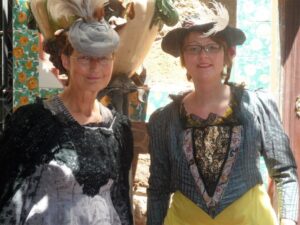
– Mit unserer lieben Mutter, Casa Vicens, Barcelona –
DAH
Muchas veces la vida es un baile frenético… Por esto he escrito el poema siguiente para una persona que quiero muchísimo!!! Se llama “Time to Wonder” como una canción de mi juventud… La dedico a él y la regalo a todas las personas enamoradas de la poesía – de las palabras dulces, el paz y la armonía…
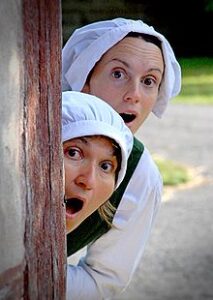
Time to Wonder
No time to get angry
No time to get sad
No time to slow down
No time to hurry up
No time to daydream
No time to write poetry
Ignore your alarm clock
Kiss your child…
Stay in bed… 😉
In Love
Doris
 Die Raben
Die Raben
Laut krächzend, ein wildes Gezeter
Ein großer Schwarm zieht über die Dächer hinweg
Der Himmel färbt sich rosarot
Ich öffne das Fenster einen Spalt
Ein kühler Abendhauch weht herein
Nebenschwaden in der Stadt
Mich in andere Sphären tragend
Verwunschene Prinzen, vergessene Poeten
Oder doch nur düstere Raben?
… in Braunschweig, September 2024. Liebe Grüße
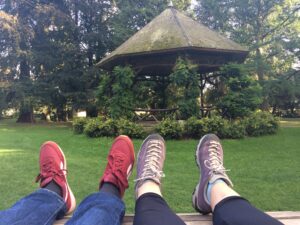 Text – „Die zwei Freunde“ (Ein von mir wiedergefundener Text… Sehr schön, sehr wahr…)
Text – „Die zwei Freunde“ (Ein von mir wiedergefundener Text… Sehr schön, sehr wahr…)
Literatur:
Lagautrière, Philippe. Piquemal, Michel. 2004. Philo fabelhaft. Kempen: Moses Verlag. S. 14–15.
Zwei Freunde bewirtschafteten gemeinsam ein Stück Land und teilten
sich die Ernte. Eines Nachts, nachdem sie beide ihren Ernteanteil
eingefahren hatten, wachte einer der Freunde auf und dachte: „Mein
Freund ist verheiratet und hat zwei Kinder. Deshalb hat er Sorgen und
Ausgaben, die ich nicht habe. Er braucht dieses Korn mehr als ich.
Aber wenn ich ihm einen Teil meiner Ernte schenken wollte, würde
er ihn nicht annehmen. Also werde ich ihm heimlich einige Säcke in
die Scheune stellen.“ Er stand auf, trug die Säcke hinüber zu seinem
Freund und legte sich wieder schlafen.
Kurze Zeit darauf erwachte der andere Freund und überlegte: „Es ist
ungerecht, dass ich die Hälfte der Ernte bekomme. Mein Freund kennt die Freuden des Familienlebens nicht. Er hat viele Ausgaben, da er ausgehen und sich seine Zeit vertreiben muss. Ich werde ihm also
einen Teil meiner Ernte geben.“
Er erhob sich und trug heimlich einige Kornsäcke in die Nachbarscheune.
Wie waren da die Freunde am nächsten Morgen überrascht, als sie genauso viel Korn in ihrer Scheune fanden wie am Vorabend!
Und so ging es alle Jahre zur Erntezeit. Das Rätsel aber, weshalb die Anzahl ihrer Kornsäcke immer gleich blieb, haben sie nie gelöst.


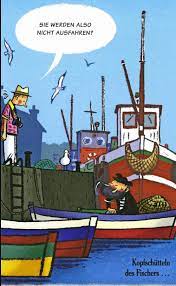 “Que le vamos a hacer?”, nos podemos preguntar. O bien podemos empezar a mejorar el mundo en que vivimos un poco, cambiando nuestra actitud en nuestro entorno inmediato, es decir en el círculo de nuestras amistades, en nuestro barrio, en nuestra ciudad … No hay que pensar siempre en términos globales, quejarse, lamentarse y dañar a los demás a lo mejor. Hay que sentir alegría cuando los demás están bien, cuando nace un bebé, cuando alguien ha aprobado un examen o ha conseguido un trabajo… Hay que sentir empatía con los demás cuando sufren sin culpa, cuando están enfermos, cuando la vida les ha quitado un ser querido que era como familia… La envidia es repelente; la empatía es admirable. Habrá siempre personas que tienen más bienes materiales que yo. Y, qué? Es el tiempo que vale oro; el oro en sí no vale nada. Lo demuestra muy bien Heinrich Böll en su cuento, “Anekdote zur Senkung der Arbeitsmoral” (“Anécdota sobre la productividad reducida”)… Expandir el negocio siempre significa más dinero, pero, muy probablemente, mucho menos calidad de vida… No se oye más el canto de los pájaros ni se escribe poesía… Todo tiene que tener su momento.
“Que le vamos a hacer?”, nos podemos preguntar. O bien podemos empezar a mejorar el mundo en que vivimos un poco, cambiando nuestra actitud en nuestro entorno inmediato, es decir en el círculo de nuestras amistades, en nuestro barrio, en nuestra ciudad … No hay que pensar siempre en términos globales, quejarse, lamentarse y dañar a los demás a lo mejor. Hay que sentir alegría cuando los demás están bien, cuando nace un bebé, cuando alguien ha aprobado un examen o ha conseguido un trabajo… Hay que sentir empatía con los demás cuando sufren sin culpa, cuando están enfermos, cuando la vida les ha quitado un ser querido que era como familia… La envidia es repelente; la empatía es admirable. Habrá siempre personas que tienen más bienes materiales que yo. Y, qué? Es el tiempo que vale oro; el oro en sí no vale nada. Lo demuestra muy bien Heinrich Böll en su cuento, “Anekdote zur Senkung der Arbeitsmoral” (“Anécdota sobre la productividad reducida”)… Expandir el negocio siempre significa más dinero, pero, muy probablemente, mucho menos calidad de vida… No se oye más el canto de los pájaros ni se escribe poesía… Todo tiene que tener su momento.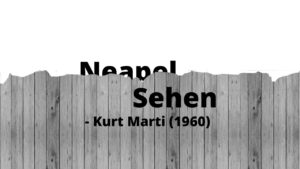
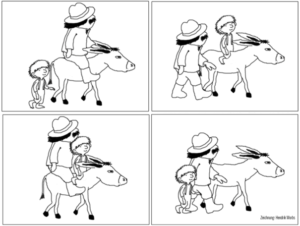 tiempo para hablar de los demás. Apenas. Al final, es todo como lo ilustra el cuento francés del padre y del hijo que van al mercado con un burro. Los dos acaban de llevar el animal porque a la gente ni les gusta que el padre monta ni que el hijo monta o bien los dos juntos. Este cuento muestra perfectamente la estupidez del cotilleo cotidiano. Un interés humano sincero es otra cosa. Y, si tengo un poco de curiosidad de que hace la otra persona, mejor que hable directamente con esa persona misma y no detrás de ella. Si no, acabamos todos como en el juego de niños Stille Post, cuando una persona susurra una cosa a otra y el resultado lamentable es una información tergiversada…
tiempo para hablar de los demás. Apenas. Al final, es todo como lo ilustra el cuento francés del padre y del hijo que van al mercado con un burro. Los dos acaban de llevar el animal porque a la gente ni les gusta que el padre monta ni que el hijo monta o bien los dos juntos. Este cuento muestra perfectamente la estupidez del cotilleo cotidiano. Un interés humano sincero es otra cosa. Y, si tengo un poco de curiosidad de que hace la otra persona, mejor que hable directamente con esa persona misma y no detrás de ella. Si no, acabamos todos como en el juego de niños Stille Post, cuando una persona susurra una cosa a otra y el resultado lamentable es una información tergiversada…